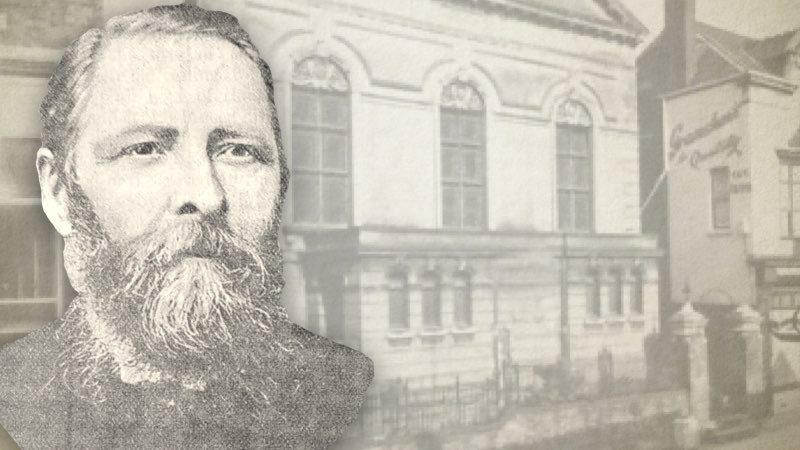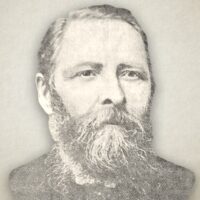
The Life And Ministry Of W. E. Palmer
Earthen Vessel 1891:
Mr. W. E. Palmer, Pastor (Succoth), Rushden, Northamptonshire
Dear Brother Winters,—At your request I give a brief outline of my strange pathway. I was born in London, May 9th, 1834.
My parents were professedly of the Established Church, and so I was brought up to that Church. My father died suddenly, when I was about five years old, and, as a consequence, as soon as able, I had to leave school and go to work. But from my earliest recollection I had a fear of God, and trembled at the thought of death. I often, to calm this fear, vowed and resolved to be a Christian. But alas! when I entered into life’s labour I sought to drown this feeling by entering into all manner of sin and wickedness.
Having been taken by a neighbour to learn the trade of a plasterer, after about two years he died, and thus being free, and knowing a good part of the trade, I was able to earn good wages, and spent them as fast as I got them in sinful pleasures; and but for free and sovereign grace I know not what the end would have been. About this time my mother went to London (we were then living in Kent); she saw a gentleman that wanted an apprentice in the flint-glass cutting trade, and she thought if she could get me in his employ it would take me from my companions in sin; and when she came home, although late, she could not go to bed till she came into my bedroom and awoke me and got my consent to go to London. I knew the life I was leading was wrong, but too proud to confess it. I secretly resolved to make no companions in London, but join some Sunday-school, and be, as I thought, a Christian.
I became a teacher, and tried hard to be a Christian, and was thought to be one by others. About twelve months after, one of the deacons of Spa-field’s Chapel (Lady Huntingdon’s) spoke to me about becoming a member of the Church. I told him that I earnestly desired that, but did not think I was quite fit. He gave me a paper with some questions on it, told me to take it home, and answer those questions as best I could. Having answered them to the satisfaction of the Church, I received a note informing me that the pastor, Mr. T. E. Thorsby, would receive me into fellowship next Ordinance Sunday. Then I thought I was indeed a Christian. I had been a member about two years, and a Mr. Lewis, of Rochdale, came to preach sermons to young people. His text was Psa. 144:15. He showed so clearly what God’s people were, that all my Christianity was gone. He left me a worthless, hell-deserving sinner, without the shadow of a hope, and not till then (with all my profession) did I know what it was to be a lost sinner. What I went through no tongue can tell, or pen write; only those who have travelled a similar pathway can understand. But blessed be God, light and liberty came at last; and through free grace, even this poor one was enabled to rejoice and sing, “Hallelujah! Jesus is my Saviour!”
From this time the desire to tell to others this glorious Gospel of the grace of God burned within me, and for some years I used to go with others, and preach in the courts and alleys of Clerkenwell, and other places.
Sometime after, the subject of baptism, its mode, and its subjects, was discussed in our young men’s Bible-class, and I was led to see immersion was right, and believers the proper subjects; but not till the year 1863 was the way made clear, when I was baptized and joined a Baptist Church at King’s Cross. The desire to speak the glories of the Cross, now seemed more intense, and being in a good position, and earning good wages, the devil often told me I had better remain as I was; but the Lord directed otherwise. I had no rest, a voice was continuously heard, “Go and tell of free and sovereign grace and everlasting salvation.” Having received a fair education, but sorely feeling my need of more, I sought an entrance into the Metropolitan College; but not having a friend at court, after waiting some months I received a note from Mr. Spurgeon, stating he thought I was too old to go through a college course, and I had better remain where I was. I need not tell you what I felt. My God knows it all, and in His own time made it plain. He opened a door for me. I was asked to take a shut-up meeting place close to Caledonian-road, King’s Cross; and in that place the Lord blest the word. About twelve months after I received and accepted an invite to Red Lion-street Chapel, and there preached with many tokens of the Father’s blessing, till removing from London, I was compelled to resign. In 1871 I joined in fellowship at Ebenezer, Hornsey-rise (W. S. Waterer, pastor). Mr. Waterer, knowing I had been preaching, asked if I would preach for him one Sunday, which the Lord helped me to do. I was then introduced by Mr. Waterer and Mr. Herring to the Strict Baptist Itinerant Society, and from that time I have been fully engaged.
The educational help I had sought years before, and had been refused, was now opened to me. I heard of the Strict Baptist Student’s Class, held at Meard’s-court Chapel. I sought, and gained admission, and have reason to be thankful for the help received. There I had the pleasure of taking a prize for an essay on the Atonement.
In 1878 I was called to preach, and received and accepted an invite to the pastorate at Offord-hill, Norwich; there the blessing of heaven was signally given. In 1883 I was removed to Zion, High Wycombe, Bucks, and there our covenant God gave many tokens of His love, to which I know many can bear witness. In May, 1889, I received a call to my present pastorate at Succoth, Rushden, Northamptonshire, and here I wait, as in times past, watching God’s band, looking for the showers to fall, and waiting His direction in all my ways. If this brief account should be helpful to anyone travelling in a strange pathway to Zion above, to our Three-One covenant God be all the praise and glory.
Yours in Gospel bonds,
W. E. Palmer
W. E. Palmer (1834-?) was a Strict and Particular Baptist preacher. After his application to the Metropolitan College was declined by Charles Spurgeon, he pursued his call to preach by ministering to local congregations, eventually receiving the appointment as Pastor for the church meeting at Succoth, Rushden, Northamptonshire, 1889.



